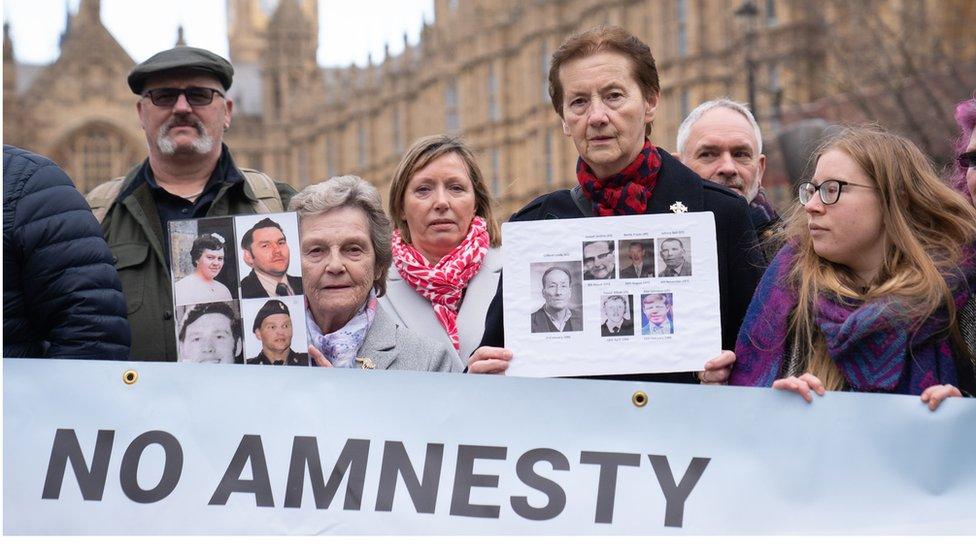Troubles legacy: Controversial bill facing more legal challenges
- Published
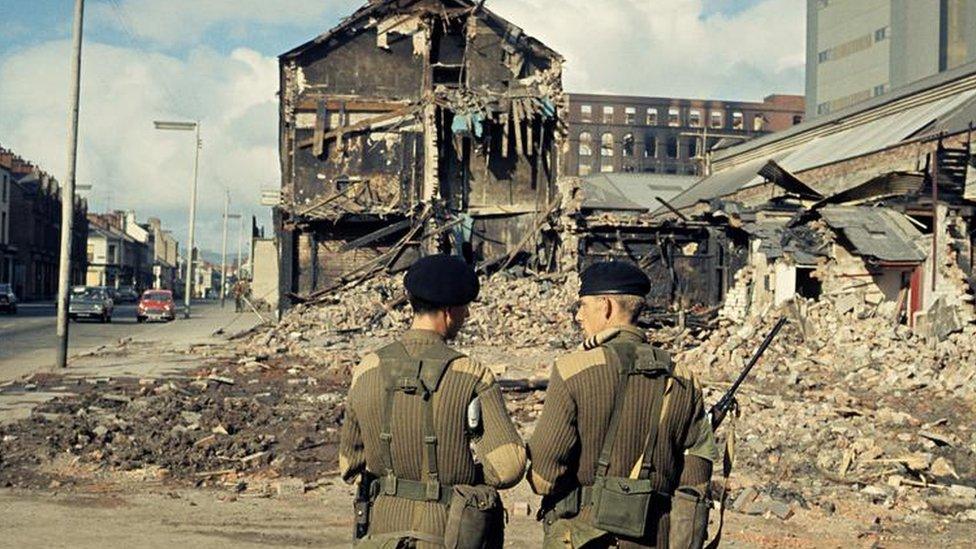
The Troubles was a period of conflict which lasted for 30 years and cost the lives of more than 3,500 people
The government's Troubles legacy bill is set to face several legal challenges at Belfast High Court, with five more issued on Monday.
The new cases, issued via Belfast firm KRW Law, mostly involve relatives of people who died during the conflict.
The bill will now face at least 11 separate legal challenges, after Madden & Finucane solicitors launched cases on behalf of six people on Friday.
The bill passed its last parliamentary stage and is awaiting Royal Assent.
It offers a conditional amnesty to those accused of killings during 30 years of violence known as the Troubles.
It will also stop any new Troubles-era court cases and inquests being held.
There has been widespread opposition to the bill. Opponents of the legislation, including victims' groups and Stormont parties, argued it will remove access to justice.
'Unconstitutional and unlawful'
KRW Law said it has applied for "emergency judicial intervention to adjudicate on the cases", ahead of the bill receiving Royal Assent and being passed into law.
Preliminary hearings will take place on 28 September, it added.
Lawyers acting for five of the people taking legal cases argued that the bill is "unconstitutional and unlawful".
They also said it is in breach of the Northern Ireland Protocol - the part of the Brexit deal which sets Northern Ireland's trade rules - as well as being in breach of Articles 2, 3, 6 and 14 of the European Convention on Human Rights.
Niall Murphy and Setanta Marley, from KRW Law, also said the bill was in breach of the Northern Ireland Protocol - the part of the Brexit deal which sets Northern Ireland's trade rules - as well as being in breach of Articles 2, 3, 6 and 14 of the European Convention on Human Rights.
They said it "represents the most egregious breach of international human rights standards".
The bill is sponsored by the Northern Ireland Office (NIO).
On Monday, an NIO spokesman said it does not comment on ongoing legal issues but added that the bill "provides a framework to deliver effective legacy mechanisms for victims and families, while complying with our international obligations".
Lord Caine, parliamentary under-secretary of state at the NIO, has previously described it as a "robust" piece of legislation that had been improved with various amendments.
Speaking when the bill passed a vote at the House of Commons earlier this month, Northern Ireland Secretary Chris Heaton-Harris said it was incumbent on the government to find a process that "can deliver positive outcomes for as many of those directly affected by the Troubles as possible".
"We must be honest about what we can realistically deliver for people in circumstances where the prospects of achieving justice in the traditional sense are so vanishingly small," he added.
However, the bill has faced opposition in Northern Ireland, the Republic and in Westminster.
Taoiseach (Irish prime minster) Leo Varadkar said it was "the wrong way to go about dealing with legacy issues in Northern Ireland".
All main Northern Ireland parties oppose it, with DUP assembly member Emma-Little Pengelly describing it as "abhorrent" and Sinn Féin MP John Finucane, whose father was shot dead by loyalist gunmen, saying it was devastating for families.
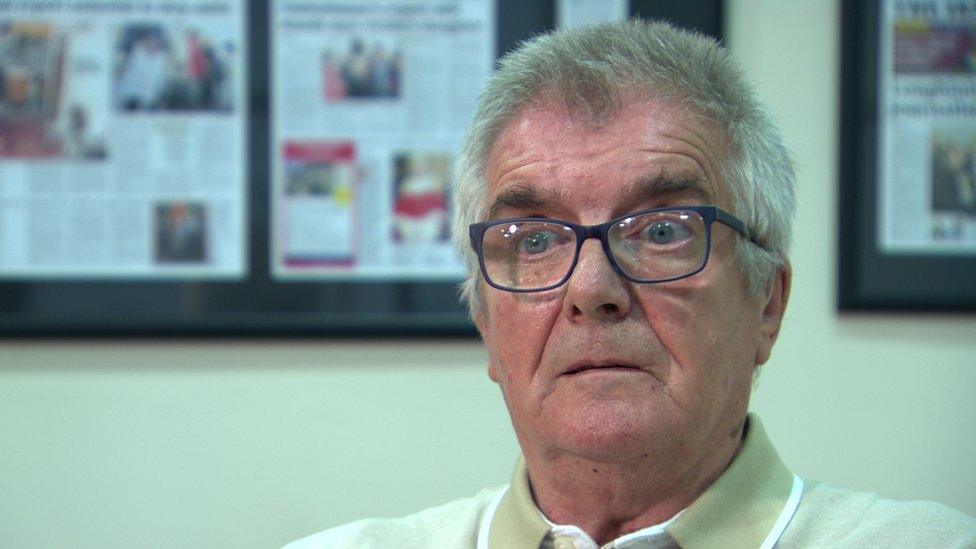
Billy Campbell's brother Tony was killed in 1973
One of those mounting a legal challenge is Billy Campbell, whose 19-year-old brother Tony was shot dead by the Army in February 1973, one of six men shot dead in the New Lodge area of north Belfast that day.
Mr Campbell said the death of his brother nearly killed his mother and still affects him.
"It just destroys you. Why is the British government deliberately rushing this through? The answer is, they are trying to hide their dirty war," he said.
In February 2021 Attorney General Brenda King ordered a new inquest into Tony Campbell's killing.
His family believes the government's legacy bill will prevent the inquest being heard.
What is the background of the legislation?
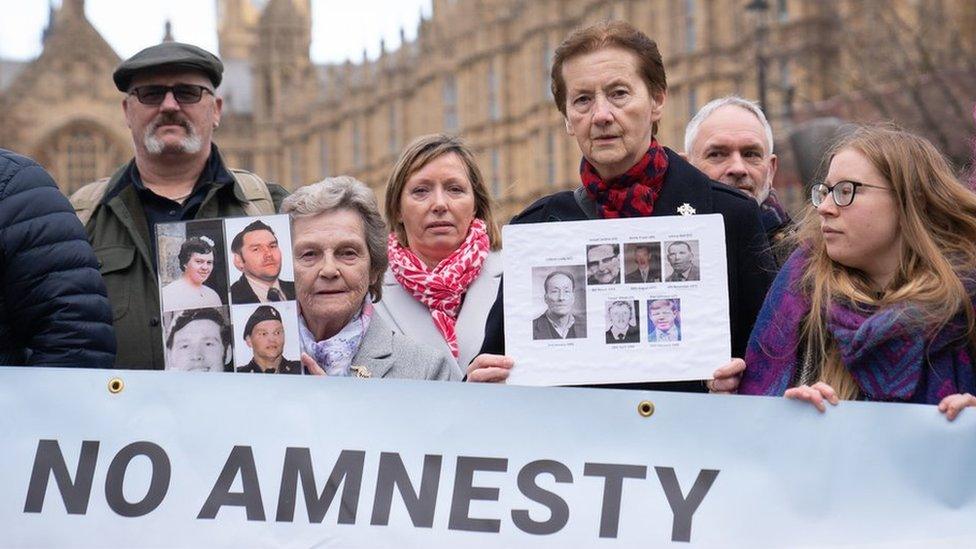
Victims groups held several protests against the Legacy Bill
The Northern Ireland Troubles (Legacy and Reconciliation) Bill was first announced in July 2021 by the then-prime minister, Boris Johnson.
Mr Johnson said the proposals would allow Northern Ireland to "draw a line under the Troubles".
In effect, the legislation would ban any new prosecutions for Troubles-related crimes and prevent victims' families from seeking fresh inquests or taking legal challenges.
The Conservative government argued that the passage of time had made the prospect of future convictions very unlikely.
It was also facing pressure from its own backbenchers who were opposed to Army veterans being prosecuted over Troubles-era incidents.
However, all of Northern Ireland's main political parties and victims' groups oppose any attempt to ban prosecutions or introduce amnesties.
What is the purpose of the bill?
Instead of historical cases coming before the courts, the legislation will establish an Independent Commission for Reconciliation and Information Recovery (ICRIR).
The aim of this new organisation is to help families find out more about the circumstances of how their loved ones were killed or seriously injured.
The government argues that the new arrangements will "promote reconciliation" and free the Police Service of Northern Ireland (PSNI) from having to investigate Troubles-era crimes.
But the plans face strong opposition as the ICRIR will have the power to grant self-confessed perpetrators immunity from prosecution, if they agree to provide a truthful account of their actions.
Prior to the bill completing its final stage at Westminster Raymond McCord, whose son Raymond Jr was murdered by the UVF in 1997, began his challenge at the High Court.
The five people taking the cases being represented by KRW law are:
Billy Campbell, on behalf of Anthony Campbell who is believed to have been shot dead by the Army in 1973. In 2021 the Attorney General ordered a new inquest into his killing and that of five other men in the New Lodge in north Belfast. Lawyers say the legacy bill will prevent the inquest being heard.
Liam Shannon, one of the Hooded Men who was interrogated by the Army after being interned in 1971. In 2021, the Supreme Court ruled the techniques they were subjected to would be characterised as torture by today's standards.
Gemma Gilvary, on behalf of her brother Maurice Gilvary, who was shot dead by the IRA in 1981. The case forms part of the Operation Kenova investigation into the activities of the Army-run agent within the Provisional IRA known as Stakeknife.
Mary Braniff, on behalf of Anthony Braniff who was shot dead by the IRA in 1981. This case is also being looked at as part of Operation Kenova.
Margaret McReynolds, who witnessed the Ormeau Road Sean Graham bookmakers murders in 1992. In 2022 she filed a High Court civil action against the UK government.
On Friday, High Court proceedings were lodged by Madden and Finucane on behalf of the following:
Billy Thompson, son of Kathleen Thompson, who was shot dead by the Army in 1971. In 2022 an inquest ruled that a soldier was unjustified in firing shots that killed the mother-of-six.
Jonathan McKerr, son of Gervaise McKerr, who was shot near Lurgan in 1982 by the Royal Ulster Constabulary (RUC)., external
Una Eakin, widow of Gerard Casey, who was murdered by the UVF in 1989 in Rasharkin.
Linda Hewitt, sister of Sam Marshall, who was murdered by loyalist paramilitaries in 1990 in Lurgan.
Teresa Jordan, mother of Pearse Jordan, shot dead by the RUC in Belfast in 1992.
Eamon Cairns, father of Gerard and Rory Cairns who were shot in their home by the UVF in October 1993.
Related topics
- Published6 September 2023
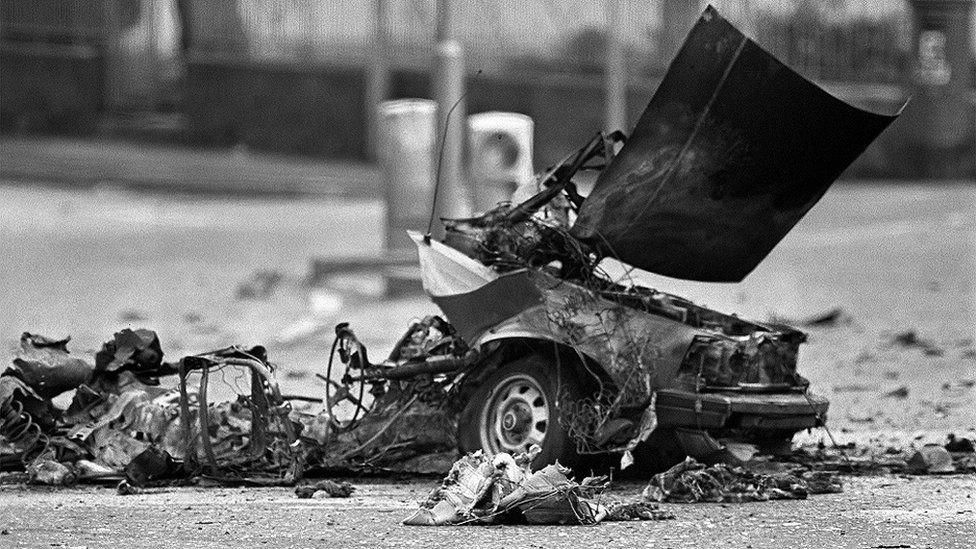
- Published5 September 2023
